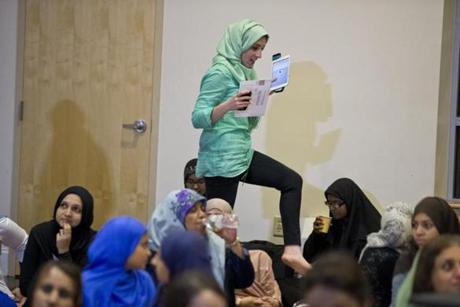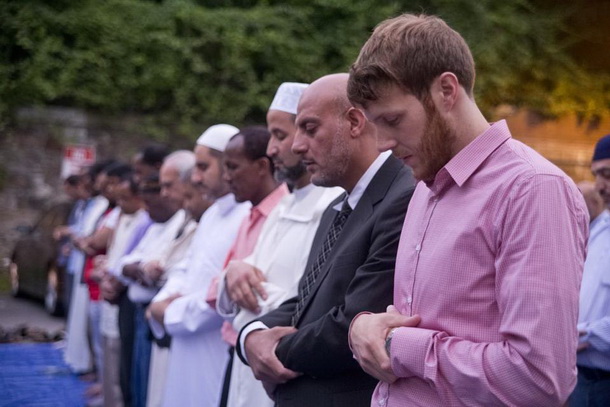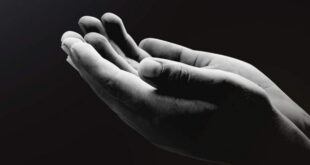By Lisa Wangsness | Source: bostonglobe.com
Brian Buzby had a splitting headache the first day of Ramadan from caffeine withdrawal and mild dehydration. He loved the late night Taraweeh prayers at the mosque, when a portion of the Koran is recited each night, and stayed long afterward talking with friends. Then he returned home to his apartment in South Boston and opened the refrigerator again.
“I don’t even go to sleep before suhoor,” the 30-year-old student told a small group of fellow converts gathered at the Islamic Society of Boston Cultural Center last week, referring to the 3 a.m. predawn meal. “I go home and I keep eating.”
A burst of laughter; their teacher, Hossam AlJabri, smiled.
“We’re still in the beginning,” he said. “But Ramadan will just keep throwing beautiful things at you.”
Ramadan — which occupies the ninth month of the Islamic calendar, when Muslims believe the Koran was revealed to the Prophet Mohammed — is the holiest time of the year in Islam, a time for fasting, self-improvement, family celebration, and intensive prayer.
For converts, Ramadan, which began the second week of July and continues until early August, can also be lonesome and bewildering. Fasting from food and water from the first light of dawn to sunset is a physical challenge. Family, friends, and colleagues who are not Muslim are not always quick to see its purpose or benefits. And without family to share the predawn suhoor meal and the evening iftar meal — those can be big family meals, or something smaller — some converts miss out on Ramadan’s communal spirit.
But Boston’s largest mosque, the Islamic Society of Boston Cultural Center, has been working to help converts enjoy Ramadan and navigate its tougher terrain.
“It’s not totally my first Ramadan, but I wasn’t part of a community last Ramadan — and there’s a big, big difference,” Buzby told his friends at the new converts’ class last week.
Unlike some suburban mosques whose members are mostly families, or mosques whose members are mostly one or two ethnic groups, the cultural center in Roxbury is diverse, urban, and filled with students and other young people who are in Boston temporarily, or just beginning to put down roots.
And the imam, William Suhaib Webb, is particularly attuned to issues facing converts — he is one.
“Especially for converts who are out of college, not married, and don’t have a strong social support group, I think the mosque becomes a place where they can come and get some family time in,” Webb said in an interview.

He said he once counseled a young woman whose mother was so upset about her conversion that she had to subsist on protein shakes in her bedroom, and sometimes broke her fast because of the immense social pressure. A positive Ramadan experience, he said, can help converts feel more at home in the community and gain confidence as Muslims.
“Twenty-nine or 30 days — you think about it, man, it’s intense,” Webb said. “And you feel so much better spiritually, you are really more sensitive to people around you.”
At AlJabri’s class and a special converts’ iftar meal the mosque sponsors each week, newcomers to the faith get a chance to share their experiences, learn, and bond. A number of those in the class were born into Muslim families but have become more observant only recently.
Some offered tips — for example, at nightly Taraweeh prayers, when the entire Koran is read over the course of the month, Kamran Ahmed said he follows along using the Quran Explorer iPhone app, which provides an English translation.
“When I had the iPhone with the translation, I would actually start crying,” said Ahmed, a medical student who attends the converts’ class because he is hoping to start a similar one in his home state of Texas next year.
After two days of fasting, many reported feeling exhilarated by the intensive observance. “I feel like I had a lot of energy from the excitement,” said Jenna Laib, a math teacher from Somerville. “I felt really uplifted.”
Not that everything had gone perfectly. Getting the hang of fasting — a gesture of solidarity with the poor and a way of focusing on the nonmaterial world — was a challenge for some at first. Leanne Scorzoni, who was raised Catholic and recently converted, fainted at work the second day of Ramadan, despite her carefully planned suhoor of a bowl of oatmeal, water, Gatorade, Pedialyte, a hard-boiled egg, a banana, and a Flintstone vitamin.
Scorzoni has not told most of her family about her conversion, she said. But, surrounded by friends at the iftar, she said she did not feel she lacked community.
“I feel more for my friends from other countries, because their families aren’t here — they’re here because of work or school, and they can’t see them, except for Skyping,” she said.
Jaleela Browder of Dorchester said she has been texting other students to help them wake up at 3 a.m. for suhoor — a bit of virtual community in the wee hours for those who live alone, or whose roommates or spouses are not observant Muslims.
“You feel that camaraderie, because we don’t have a whole Muslim family to wake up with in our homes,” the 23-year-old said.
Others’ families were supportive, if not always helpful. Elizabeth Hughes, a psychology graduate student from Wellesley who formally converted a few weeks ago, said her mother has been “very open, very understanding, very proud” of her newfound religious conviction. But after a short hike together, her mother proffered a water bottle, saying, “Why can’t you just drink water?”
“There’s points where there’s not the same wavelength, even when there are really good intentions,” she said. She added, a bit later, “It’s hard to explain what the blessing is in fasting.”
AlJabri said he advises his students to be patient, especially with their parents, when trying to explain their new religious practice to non-Muslims.
Patience, after all, is one of the most important qualities Muslims try to cultivate during Ramadan, and the subject of a class discussion last week. Once converts get over their initial nervousness and plug into a community, AlJabri said, they can immerse themselves in Ramadan’s larger purpose.
“The most memorable part of Ramadan is not a challenge but rather the spiritual journey,” he said. “The feeling for many of them at the end of the month is, ‘I wish there were two months of Ramadan.’?”
Lisa Wangsness can be reached at lwangsness@globe.com.
 navedz.com a muslim's Quest for the truth
navedz.com a muslim's Quest for the truth









